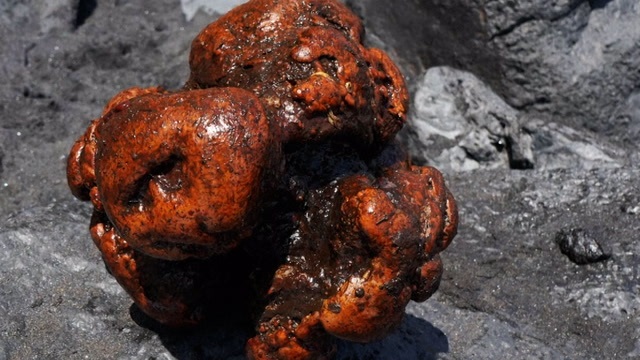Scientists Find ‘Floating Gold’ Worth £425,000 Inside Dead Whale

In the pristine waters surrounding the Canary Island of La Palma, scientists stumbled upon a remarkable and unexpected treasure – a 21-pound lump of ambergris, often referred to as ‘floating gold.’
This valuable substance, worth an astonishing £425,000, was found nestled within the digestive system of a sperm whale that had washed up on La Palma’s Nogales beach, making headlines on July 12, 2023.
The Valuable Discovery
Ambergris, a rare and highly coveted substance, is renowned for its historical significance in the world of perfumery. This remarkable find, originating from a sperm whale’s intestines, has opened up new opportunities.
Antonio Fernández Rodríguez, the discoverer of this ambergris treasure and the head of the Institute of Animal Health and Food Security at the University of Las Palmas, has expressed his intent to utilize the proceeds from its sale to support the victims of a volcanic eruption that ravaged the island two years prior.
The 42-foot whale met a tragic end, succumbing to sepsis, directly attributed to the lump of ambergris within its digestive system.
While heavy seas and a rising tide posed challenges during the analysis, Rodríguez was determined to complete the mission and bring this unique discovery to light. This selfless act might help heal some of the wounds inflicted by the devastating volcanic eruption.
The Anatomy of Ambergris
Ambergris, sometimes affectionately referred to as ‘floating gold’ or ‘grey amber,’ possesses an extraordinary allure due to its historical use in the perfume industry.
It is a rare substance, produced by approximately one in every 100 sperm whales. The enigmatic origins of ambergris were only unraveled with the proliferation of whaling in the early 19th century.

Sperm whales, as colossal sea creatures, consume vast quantities of squid and cuttlefish. Much of this prey, indigestible to the whale, is expelled from its stomach.
However, some remnants of this diet bind together over time in the whale’s intestines, forming the coveted ambergris.
This ‘floating gold’ is typically found adrift in the sea, but in some instances, as witnessed with the La Palma whale, it can grow to such proportions that it ruptures the whale’s intestine, ultimately leading to the whale’s demise.
The discovery of a whale carcass carrying ambergris is akin to a stroke of fortune for fortunate fishermen or beach-goers who stumble upon it.
Ambergris is cherished in the perfume industry for its woody scent and ambrein content, which is an odorless alcohol that extends the lifespan of fragrances.
The Legal Landscape
While the revelation of this substantial ambergris deposit is a remarkable boon, it is essential to understand the legal nuances surrounding its trade.
The United States, Australia, and India have enacted bans on the trade of ambergris to discourage whaling. The trade of this precious substance is governed by distinct regulations in different regions.
Nevertheless, the University of Las Palmas is actively seeking a buyer for this valuable ambergris, with the noble objective of funding repairs in the aftermath of a devastating volcanic eruption on the island in 2021.
This eruption inflicted over £685 million in damages, devastating countless homes and businesses. Rodríguez, the discoverer, holds the hope that the proceeds from the ambergris sale will benefit the island of La Palma, where the whale met its end.
In conclusion, the discovery of ‘floating gold’ within the digestive system of a washed-up sperm whale on the Canary Island of La Palma is a testament to the mysterious and valuable treasures that the sea can hold.
Beyond its intrinsic value, ambergris also serves as a poignant symbol of hope for a community recovering from the aftermath of a devastating natural disaster.
The legal complexities surrounding the trade of ambergris highlight the importance of navigating international regulations while leveraging such discoveries for the greater good.
